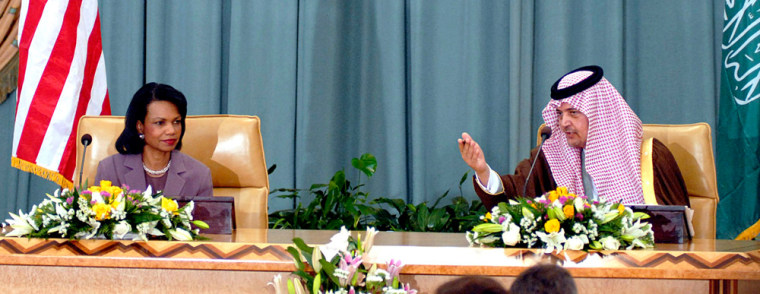Secretary of State Condoleezza Rice’s appeal for Arab allies to help support the fragile government in Iraq drew only a tepid endorsement Tuesday from the administration’s strongest ally in the region.
Saudi Foreign Minister Saud al-Faisal said Saudis hope President Bush’s plans to turn around the situation in Iraq is a successful, but was plainly skeptical that the Iraqi government is up to the task of doing its part.
“We are hoping these objectives will be implemented, but the means are not in our hands,” he said. “They are in the hands of the Iraqis themselves.”
Al-Faisal spoke at length about the centuries old civilization in Iraq where Sunni and Shiite Muslims have been living together for years, but are now threatened by sectarian violence that has killed thousands.
“I cannot for the life of me conceive that a country like that would commit suicide,” said al-Faisal, adding that he prefers not to speculate about he called the “dire consequences” of a Sunni-Shiite civil war.
'We share responsibility'
Rice thanked the Saudis for their past help in urging national reconciliation in Iraq, but did not press specific new requests for the predominantly Sunni kingdom’s help.
Although a distinct minority, Sunnis had dominated the government in Iraq until the U.S.-led ouster of Saddam Hussein left Shiites in control.
Rice, who has said debt relief would be a good way for Saudi Arabia to help its neighbor, sounded more optimistic than al-Faisal about the will of the Iraqi government.
“As the president has said, Iraqis have to decide what kind of country they will be,” Rice said, alluding to Bush’s assertion that the ultimate future of Iraq is in the hands of Iraqis.
Rice and al-Faisal commented after a morning meeting that followed a Monday evening dinner for Rice hosted by Saudi King Abdullah.
She was heading to Kuwait later Tuesday to meet with counterparts from eight Arab countries to continue her quest for assistance with Iraq.
“We share risk and we share responsibility, because this is an area of the world which will very much be affected by how Iraq turns out,” Rice said during a press conference Monday in Egypt.
The Arab leaders are eager for the U.S. to take a larger role in brokering peace between Israel, the Palestinians and others in the region. While in Egypt, Rice announced she will bring together the Israeli and Palestinian leaders in the coming weeks for a summit dedicated to exploring ideas for an eventual Palestinian state.
Jordan's warning
Before she left Washington, Rice told Congress that Saudi Arabia should do more to help the Iraqi government because a “failed state” next door to the kingdom would ensure an expanded role in the region for old rival Iran.
Testifying before the House Foreign Affairs Committee, Rice said the “single best thing” Saudi Arabia could do would be to provide debt relief for Iraq.
Rice was responding to a question from committee chairman Tom Lantos, D-Calif., who said the Saudis should use revenues from high oil prices to ease the U.S. financial burden in Iraq.
Rice said she does not envision a Saudi offer to send forces to Iraq because Baghdad is reluctant to have neighbors or near-neighbors play such a role.
To the extent that the kingdom has been active in Iraq, she said, it has been to encourage Iraq’s Sunnis to join the political process. She warned that if Iraq descends into chaos, Shiite-dominated Iran could fill the vacuum.
Jordanian King Abdullah II warned Rice that Iraqi political reconciliation would fail if Sunni Iraqis were not engaged in their country’s decision-making.
“Any political process that doesn’t ensure the participation of all segments of Iraqi society will fail and will lead to more violence,” Abdullah told Rice in their talks over the weekend, according to a statement by his press office.
Like other U.S. allies such as Egypt and Saudi Arabia, Jordan is concerned about the growing Shiite Muslim influence, stretching from Iran through Iraq, Syria and Lebanon. The fear is that the hard-line Tehran government will dominate the Middle East and give rise to more extremism, jeopardizing a Middle East settlement and threatening those nations.
Bush plan meets criticism
Bush’s new strategy to send thousands more troops to Iraq met with strong skepticism across the Middle East, where many predicted that even with more soldiers, America would fail to break the cycle of violence.
There were deep doubts that U.S. troops, or the Shiite-led Iraqi government, would tackle what many in the Sunni-dominated Arab world see as the chief threat to Iraq: Shiite militias, blamed for fueling the cycle of sectarian slayings.
Iraqi Prime Minister Nouri Al-Maliki has resisted U.S. pressure in the past to move against militias, but last week he pledged to crack down on political ally Muqtada al-Sadr’s Mahdi Army.
Many in the Arab world profoundly distrust al-Maliki’s government, believing it is serving Iran’s interests at the expense of Sunnis. Bush’s plan depends heavily on al-Maliki to use Iraqi troops to crack down on militants from both sides and meet a series of benchmarks to promote reconciliation between Sunnis and Shiites.
Egyptian Foreign Minister Ahmed Aboul Gheit, a frequent critic, was ready to give Bush’s plan the benefit of the doubt Monday.
“We are supportive of that plan because we are hopeful that that plan would lead to ensure the stability, the unity and the cohesion of the Iraqi government,” he said.
